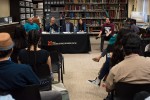UCLA alumni who participated in a hunger strike in 1993 said at an event Tuesday they faced racial and cultural barriers as indigenous students.
The Eagle and the Condor Liberation Front, a student-led organization that promotes the unity of indigenous peoples, hosted an event to honor the 14-day sit-in and hunger strike in 1993 that led to the creation of the Chicana/o studies department. Indigenous peoples are those who first inhabited a specific area, despite any groups that have since settled in, occupied or colonized the region.
The event featured panelists who said they were frustrated that the university administration did not approve student proposals for the creation of a Chicano/a studies department in 1990.
Marcos Aguilar, a panelist who participated in the strike, said they were willing to risk their lives to stand up to the administration.
Aguilar said he hopes the Eagle and the Condor Liberation Front learns from their experiences and continues to advocate for the future of indigenous studies at UCLA.
“It’s important for our youth to see beauty in the struggle as well,” he said. “We want them to see the obligation and responsibility to use the resources available to go back and help our communities which are still under attack.”
Michelle Servin, a first-year Chicano/a studies and international development studies student and a member of the Eagle and the Condor Liberation Front, said the strike demonstrated how determined the students were to create the department.
“People did not eat for 14 days,” she said. “People just wanted to show the institution that this (department) is necessary and they were willing to put their lives on the line.”
The Eagle and the Condor Liberation Front works to bridge the divide between indigenous peoples of North, Central and South America. Students from the Chicano/a studies department and American Indian Studies Center started the organization in November to bring together indigenous people of various backgrounds to learn from each other and break physical and cultural divides between indigenous peoples in the Americas.
Maritza Geronimo, a second-year Chicano/a studies and American Indian studies student and a member of the organization, said its name originated from the Quechua prayer of the Eagle and the Condor.
“They envisioned that indigenous people of the North, Central and South America would be united,” Geronimo said. “We always hope to stay grounded and do the work that centers around that prayer.”
Servin said that the terms Chicano and Chicana are often misinterpreted as only referring to one’s nationality, but they also refer to an individual’s indigenous roots.
“The identity of being indigenous is something you feel,” Servin said. “For me personally, I feel connected to the land; I feel connected to everything and everyone around me.”
Since its founding, the organization has hosted the quarterly Indigenous Speakers Series, where community members and students have a dialogue on cultural topics such as decolonization, spirituality and traditional medicinal practices. The series aims to strengthen the relationships between the indigenous community on campus and indigenous communities outside UCLA.
“We always have great turnouts,” Geronimo said. “I am also happy that we always keep our elders in mind and we are working on establishing our elders council.”
Ary Amaya, a second-year environmental science student, said the organization plans to promote the practice of indigenous customs on campus through food sovereignty and traditional activities such as gardening, ceremony and dance. She said the organization also hopes to establish a council of elders to achieve these goals.
“In native culture, the elders have always been the ones to teach the youth,” Amaya said. “As indigenous people, we want to continue that. They guide us.”
